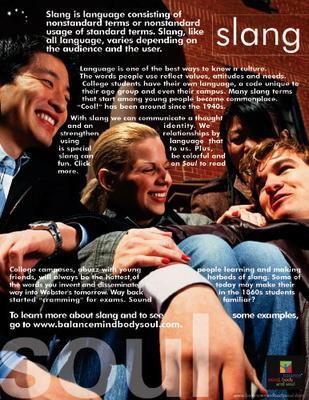In response to these ridiculous things, each time I sit down at a table, I tear them up. If I’m feeling particularly rowdy, I’ll tear them up at other tables. Generally my friends are embarrassed, but I will not stand to let this ridiculous crap be put out to us. Given that they are so banal, I suspect that there are subliminal messages contained within them.
Here’s a recent one that makes me laugh:

Who tries to teach college kids about the existence of slang words, especially since they consider colleges to be the “hottest of hotbeds of slang”? Because I was curious how they would enlighten me on this topic, I went to their website and found some of these gems:
“Yo!” Do you have enough “lettuce” for a cup of “joe? When you order eggs do you ask the cook to “wreck em”? Or do you feel “vexed” after reading this? “For real?”
Language is one of the best ways to get to know a culture. The words people use reflect values, attitudes, and needs. When a librarian says, “Check out that book” he means, “Borrow that book.” When your friend says, “Check out that book” she means, “Take a look at that book.” A mature speaker and writer adjust language to the intended audience. Context also helps make meaning clear. If someone walked toward you and said, “What’s the dilly?” you would recognize that the phrase means, “What’s up?” or “Hi, how are you?” If someone looked in a jar and said, “What’s the dilly?” you would think that person was planning to eat a dill pickle.
I’m still vexed, for real. Check it out, I’m hungry for the dilly.


No comments:
Post a Comment